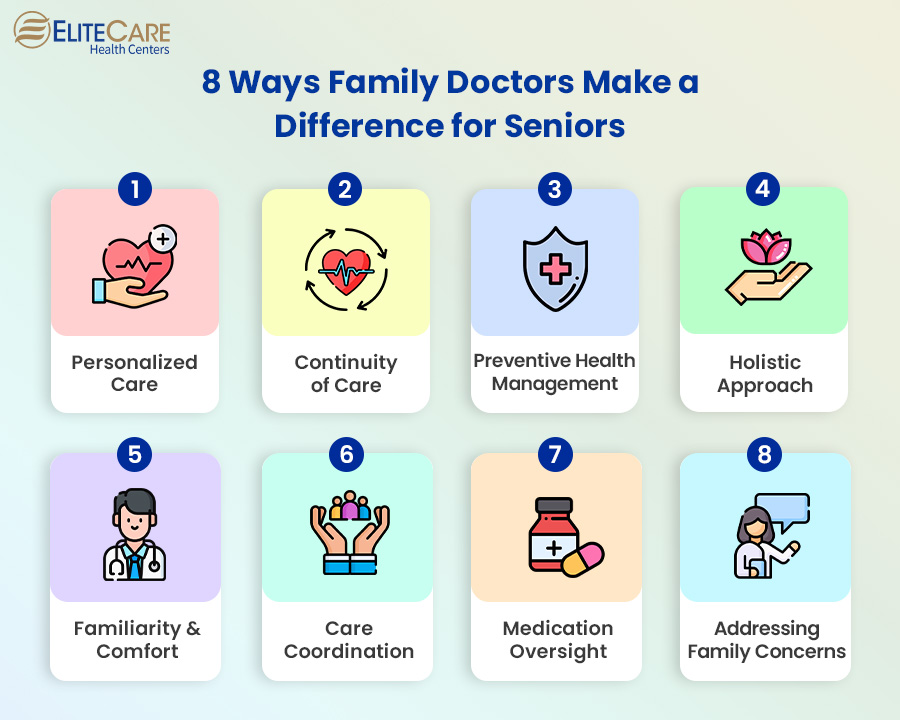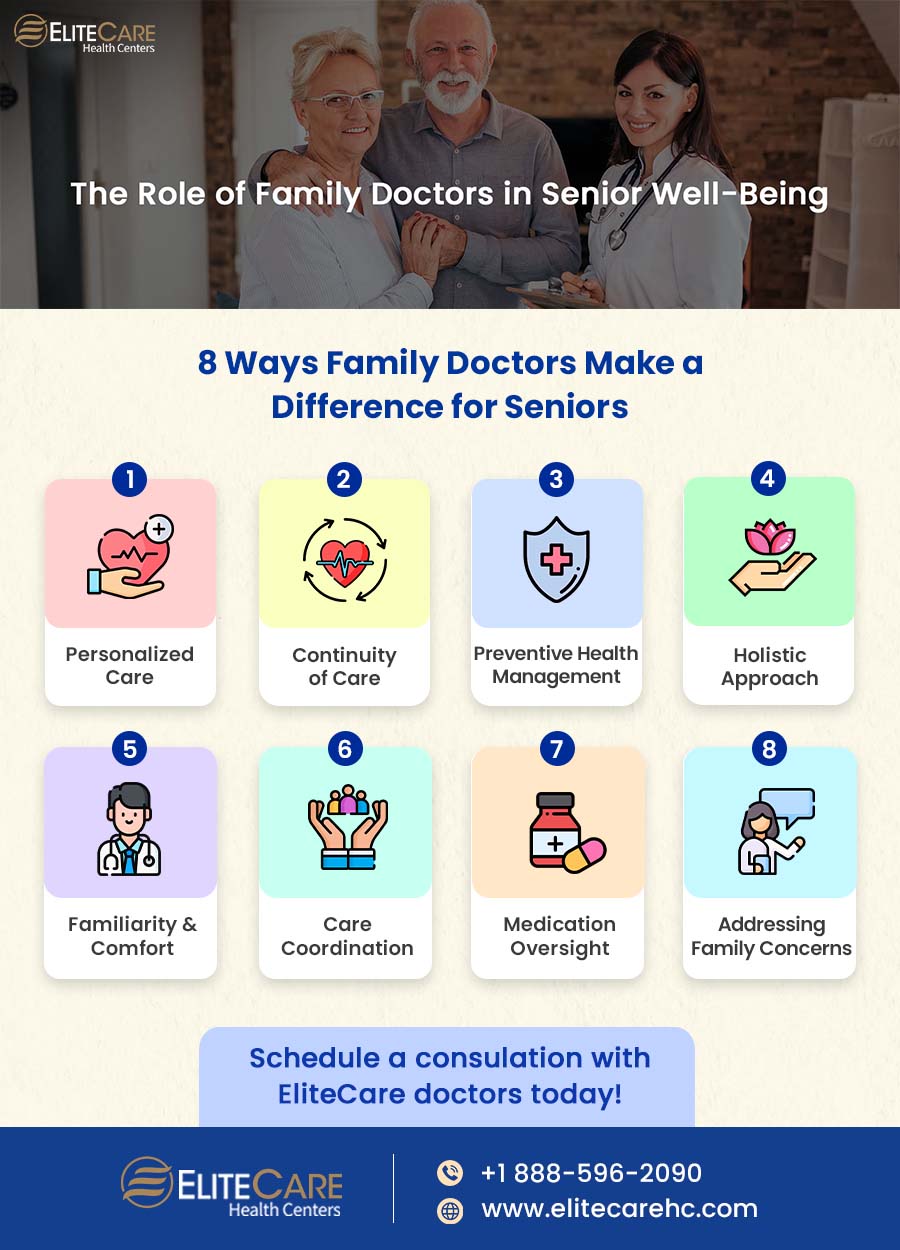
In today’s fast-changing world of medicine, one thing remains constant – the value of having a family doctor. As we grow older, looking after ourselves becomes a top priority, and that’s when having a family doctor by our side becomes even more crucial.
With age, health needs can become a bit more complex. Medical histories tend to accumulate, giving rise to countless conditions that require ongoing management. How our physical, emotional, and mental health aspects work together necessitates a healthcare approach that goes beyond the conventional. Within this context, we delve into the advantages of having a family doctor for seniors. In the upcoming parts, the blog post will dive into how family doctors make a real difference in the lives of seniors. The family doctors understand what we need and ensure our senior years are the best they can be.
8 Ways Family Doctors Make a Difference for Seniors

1. Personalized and Comprehensive Care
Family doctors are like primary care physician at a medical clinic or health care center who take extra care of seniors. They know what’s worked in the past and what might work best for their patient now. Whether managing chronic conditions, addressing emerging concerns, or adjusting treatment plans, family doctors possess an intimate familiarity with their patients’ health that promotes more accurate diagnoses and more effective treatment strategies.
A pivotal aspect of personalized care is family doctors’ relationship with their senior patients. This relationship is based on medical knowledge, trust, and open communication. Seniors often find it easier to discuss sensitive health matters with a doctor who knows their history and understands their preferences. Such rapport leads to a better exchange of information, resulting in more accurate diagnoses and tailored treatment plans.
2. Continuity of Care
Having steady and reliable healthcare experts in senior care services is vital when caring for oneself as an old. Especially when dealing with chronic health issues such as diabetes, hypertension, and arthritis. A family doctor’s continuity of care is precious in such cases.
Through routine physical exams, constant communication, and a profound understanding of the patient’s history, family doctors create a cohesive approach to managing these conditions.
The continuity of care offered by family doctors empowers seniors by enhancing their understanding of their health. Family doctors bring a wealth of knowledge to the table, giving seniors the power to take charge of their health. With their guidance, seniors can make choices that suit them best, leading to healthier lives and overall well-being.
3. Preventive Care and Health Management
Staying healthy in seniors is not just about treating problems but preventing them. Family doctors take a proactive approach that encompasses regular checkups, vaccinations, and health screenings, all of which contribute to the early detection and management of potential issues. Primary care physicians prioritize regular checkups, as routine visits allow the doctor to track changes, identify emerging concerns, and adjust treatment plans accordingly. Besides regular checkups, the doctor ensures that seniors are up to date on vaccinations, protecting them against preventable diseases such as influenza, pneumonia, and shingles.
4. Holistic Approach to Health
Family doctors recognize that physical parameters don’t solely determine seniors’ health. Emotional and mental well-being play an equally vital role in their overall health. Factors such as isolation, grief, anxiety, and depression can impact seniors’ quality of life. Family doctors engage in open conversations about these matters, fostering a safe space for seniors to discuss their emotions.
Like individuals of any age, seniors aspire to enjoy a high quality of life characterized by vitality, purpose, and joy. Family doctors collaborate with their senior patients to establish wellness plans that encompass medical treatments, lifestyle adjustments, social interactions, and mental stimulation. By enhancing these aspects, family doctors enrich seniors’ overall quality of life.
5. Familiarity and Comfort
The beauty of having a family doctor for seniors lies in the familiarity that develops over years of consistent care. Seniors who have visited the same doctor for an extended period often experience a profound sense of trust.
Seniors with a longstanding relationship with their family doctor are more likely to discuss a broader range of health matters, from routine to sensitivity. This communication is essential, as it allows doctors to comprehensively understand the senior’s health status, lifestyle, and concerns. The consistent presence of a family doctor throughout the years creates a sense of security that is invaluable for seniors, especially when an online doctor consultation is available for seniors with mobility issues.
6. Care Coordination and Referrals
Family doctors act as central figures in a senior’s healthcare journey. With an in-depth understanding of the senior’s medical history, preferences, and needs, they play an essential role in coordinating various aspects of care. From routine and annual physical exams to specialized treatments, family doctors serve as the primary point of contact, streamlining the experience and minimizing the potential confusion from interacting with multiple healthcare providers.
Seniors often require specialized care due to the complexities of age-related health issues. Family doctors recognize the situation and know when it demands the expertise of a specialist. A significant advantage of having a family doctor for seniors lies in preventing gaps in treatment. By serving as a central coordinator, family doctors ensure that different aspects of a senior’s health are monitored and managed in a coordinated manner. This continuity minimizes the risk of treatments or recommendations falling through the cracks, leading to a more comprehensive and practical approach to senior healthcare.
7. Medication Management
8. Addressing Family Concerns
Family doctors are dedicated to the health of the senior patient and recognize the importance of involving and addressing the concerns of family members. They acknowledge the role of caregivers and provide them with guidance, education, and support. By offering information about the senior’s conditions, treatment plans, and potential lifestyle adjustments, family doctors empower family members to contribute effectively to the senior’s well-being.
Most of the time, family members have concerns, questions, or anxieties about the health of their senior loved ones. Family doctors serve as a communication bridge, addressing these concerns and providing reassurance through accurate information and insights. The involvement of family members in a senior’s healthcare journey creates a network of support that can significantly enhance the well-being of the senior.
The Bottom Line
Having a family doctor is extremely important, as their personalized care and unwavering support make a huge difference in the health and happiness of seniors. If you’re looking for a place that offers this special care, consider EliteCare Health Centers. Our team of primary care physicians is dedicated to providing top-notch senior care services. According to a study, the senior-friendly hospital can help improve older patients’ care.
So, whether you’re a senior or a family member, remember the benefits of having a family doctor by your side. Consider the advantages of building a long-term relationship with them. It’s an investment in well-being that can pay off in a healthier, happier, and more fulfilling life. Your journey to better health starts with a family doctor who is always there for you.






